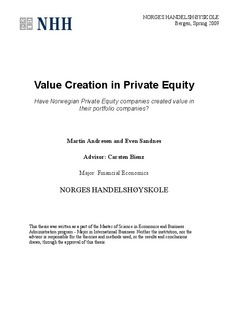Value creation in private equity : have Norwegian private equity companies created value in their portfolio companies?
Master thesis
Permanent lenke
http://hdl.handle.net/11250/168227Utgivelsesdato
2009Metadata
Vis full innførselSamlinger
- Master Thesis [4372]
Sammendrag
This paper investigates value creation in 31 private equity-owned companies in Norway
between 1993 and 2007. Its purpose is to find evidence on increased value capturing for
these companies relative to non-private equity-owned companies. We have looked at the
development of companies that have been engaged in a full leveraged buyout process with
Norwegian private equity firms from entry to exit.
Value creation is made through several different drivers, which are thoroughly presented in
this thesis. The empirical analysis in our thesis has been focusing on value creation through
direct drivers since these drivers may easily be analyzed using publicly available data. By
doing statistical tests on ratios that help explaining these drivers, we were able to present
evidence on whether private equity-owned companies have been able to outperform their
comparables during the private equity firms’ holding period.
Our results suggest that private equity firms have been successful in obtaining significant
revenue expansion and cost reductions/margin improvements for their portfolio companies
on an isolated basis. In terms of improved asset utilization and financial engineering we are
unable to provide any adequate significant results. In addition, it seems like buyout
companies do not experience any significant changes in employment or changes in levels of
wage expenditures.
The industry-adjusted results suggest that buyout companies do not significantly outperform
their corresponding peers in regard to revenue expansion and cost reductions/margin
improvements. Buyout companies seem to have a somewhat stronger improvement in capital
productivity than their peers, implying an outperformance from the buyout companies.
Moreover, our results do not support any significant changes in long-term debt share during
the holding period of private equity firms or large differences in long-term debt levels
relative to their peers at entry, exit and exit +1. Finally, industry-adjusted employment
growth and changes in levels of wage expenditures do not support any categorical beliefs
about massive lay-offs or drastically reduced wage expenditures during the holding period of
a private equity firm.
